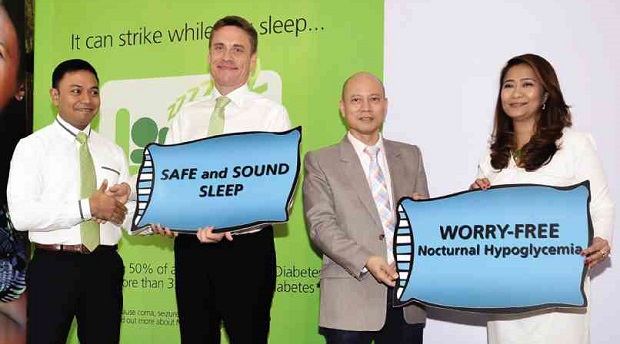Diabetics warned vs dangers of night-time low blood sugar

FROM LEFT are Novo Nordisk Pharmaceuticals (Philippines) product manager Carlo Garcia and general manager Jeppe Theisen, Diabetes Philippines president Dr. Richard Elwyn Fernando and Novo Nordisk Pharmaceuticals (Philippines) marketing manager Carole Lopez.
Be on guard against night-time low blood sugars.
Expert are making this call in light of a not much noticed but very much dangerous crisis that is nocturnal hypoglycemia, more commonly known as night-time low blood sugar.
Speaking to reporters during “Media Briefing on Nocturnal Hypoglycemia” organized by diabetes care pioneer Novo Nordisk on May 27 in Quezon City, Dr. Richard Elwyn Fernando, a diabetes specialist and president of Diabetes Philippines, pointed out the looming danger, since almost 50 percent of all hypoglycemic events occur during the night. “In severe cases, nocturnal hypoglycemia can cause coma, seizures, brain damage and death.”
Nocturnal hypoglycemia occurs when blood glucose levels fall below the target physiological level (4 mmol/l or 72 mg/dl) at night time. Common symptoms are difficulty in waking up, night sweats, waking with a headache, being tired despite a full night’s sleep, nightmares and talking during sleep. It may be related to the dose of diabetes medication a person is taking and the level of activities he or she carried out earlier in the day. It affects up to 50 percent of adults with type 1 diabetes and over 33 percent of people with type 2 diabetes.
Education is the key, said Fernando. “Nobody is at fault, the doctor or the patient, because it happens [out of their control].” He added “inappropriate monitoring, use of, and adjustment to medication” are the real culprit, so “there are times that we need to adjust.”
He urged patients to be aware on the right use of the medications. “Regular checkup, regular monitoring of blood sugar and blood pressure, weight management—all of them go together. Diabetes is not only about blood sugar, the entire person is also affected.”
Menace
Although the majority of people with diabetes experience nocturnal hypoglycemia several times a month, they remain underreported and many go unrecognized. “[They] may not be aware they are having nocturnal hypoglycemic events and therefore are unable to treat themselves or to seek assistance,” Fernando said.
He cited factors like not having a night-time snack when it is usually taken; imbalance between the diabetes medications and the timing and frequency of meals, early or delayed meals; increased physical activity in the past 24 hours; alteration in level of insulin or other blood glucose-lowering medications; content of meals, like those which are high on fat, and alcohol consumption can contribute to the development of nocturnal hypoglycemia.
A person may experience physical fatigue and find it difficult to function at work following a nocturnal hypoglycemic event. “It can adversely affect a person’s mood and well-being, sleep patterns, relationships and ability to work,” said Fernando. It can also affect family members who are fearful of their loved ones having hypoglycemic events, in terms of emotional, financial and other aspects.
To prevent nocturnal hypoglycemia, Fernando recommended eating a snack that has slow-acting carbohydrates or is a good source of protein before going to bed, which may include raw vegetables, nuts, a small piece of wheat bread with a cut of ham or chicken slices, cheese and apple slices. For people with nocturnal hypoglycemic events that can be self-managed, Fernando recommended eating between 10 and 15 grams of fast-acting carbohydrates (e.g. soda, a piece of candy or chocolate bar) after an episode occurs to quickly raise blood glucose levels back to normal.
Adjustments
People on insulin or other blood glucose-lowering medication who experience nocturnal hypoglycemia regularly should talk to their doctor about decreasing their dosages or changing their regimen. “Insulin regimens vary in their onset of action, times to peak effect and effective duration of action. These variations, in turn, affect both blood sugar control and hypoglycemic episodes, and should be taken into account when determining adjustments,” said Fernando. He also recommended regular blood glucose monitoring, particularly before going to bed and in the morning.
Also in the same event, Novo Nordisk exhibited its Hypo Simulator to give people the sensation of what it is like to experience hypoglycemia while doing a variety of tasks. Jeppe Theisen, Novo Nordisk Pharmaceuticals (Philippines) Inc. general manager, said: “It is to get people to understand how terrifying it is to live with diabetes and get hypoglycemia. It shows how severe can hypoglycemia [affect] daily lives.”
According to Theisen, the Hypo Simulator is one of the awareness programs of Novo Nordisk. “We started a few months ago. But those trying it are saying: ‘Okay, this is for real. It is not just something we are talking about.”
For Theisen, to experience how hypoglycemia attacks is one of the most effective way to make people aware of the dire situation diabetics are subjected to.














